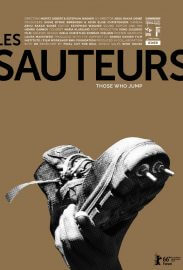
https://www.filmplatform.net/product/those-who-jump
“Those who jump”, ultimately a film about making a film, is Abou’s portrayal of the human struggle for dignity and freedom on one of the world’s most militarized frontiers. In northern Morocco, lies the Spanish enclave of Melilla: Europe on African land. On the mountain above, live over a thousand hopeful African migrants, watching the fence separating Morocco and Spain. Abou from Mali is one of them. For over a year, he has ceaselessly attempted to jump the fence. Through the lens, Abou gradually finds expression and meaning in his situation. “When filming, I feel that I exist”.

“The passport is the most noble part of man,” a man in Brecht’s Refugee’s Dialogues once stated. Seventy years later, with daily news on the migrant situation at Europe’s borders, the statement remains a disturbing truth.
For those of us born on the right side of the fence, impermeable borders are a rare encounter. But for those on the other side, like Abou, who happen to hold a Malian passport, the options are extremely limited.
When reports of the massive attempts to storm fences in Melilla began to spread in 2014, we were deeply struck by the resilience of the mainly sub-Saharan men on Mount Gurugú. Regardless of how often they fell, no matter how painful their failures – they just seemed to stand up, wipe off the dust and carry on towards their goal.
Granted, there is no shortage of stories of the tragedies at Europe’s borders. But our impression is that the circulating images are rather limited. One voice seemed always missing: the voice of the people concerned.
In order to challenge the dominant image of a migrant, we had to first challenge our own approach as filmmakers. We decided to radically take the perspective of our protagonist, and leave him to decide what aspects of life to film. So we passed the camera to Abou. We were curious to learn what he would film, what aesthetical choices he would makes, and how these choices relate to the existing images of migrants.
Abou’s approach to the project initially differed from ours. His main concern was to tell the world about the great injustice he and his friends endure at the fence of Melilla. But gradually the filming itself became an interest and form of expression for him. He switched from being the protagonist to the co-director. Ultimately, the film also became a film about making a film.